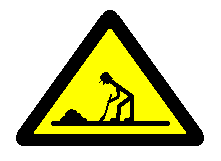

With a big enough maglev train, located along the lunar equator, cargo and spaceships can pretty much be delivered not just to the lagrangian libration points, but to pretty much any place in the plane of the ecliptic. This means that deliveries from the moon to mars, or the asteroids, or perhaps places farther afield will require essentially little or no fuel if launched off the back of a mass driver.
Constructing spacecraft on the moon, especially spacecraft with nuclear
engines is also advantageous. These spacecraft need not be equipped
with aerodynamic shrouds in order to punch through the atmosphere of earth,
nor would they be subject to high atmospheric pressure loads to which earth
launched vehicles are subject. In fact, their shape would not be
dictated by the requirements of launching off of a planet with an atmosphere
whatsoever. If someone was inclined to put doughnut-shaped spacecraft
into orbit, it would be no big deal from the moon. Also, space probes
could be launched with their solar panels and antennas extended, greatly
simplifying their overall construction. In fact, space probes could
be up and running and being tested up to the moment they were to be released
from the mass driver, greatly increasing their survival rate into space.
Space Exploration within a Context
So the moon may become the source of the 21st century's energy supply, and may be a profittable place to manufacture tools and materials impractical to manufacture on earth, and/or it may become the launch-pad for humanity to economically venture out into the solar system. All of these things may come true ... or not.
When you look at lunar colonization from the point of view of the present, it appears to be a prohibitively expensive venture, with at best a long term possibility of breaking even. So the critics will justifiably say, "why should we spend our money on that? Why should we go do that now?"
I could answer by saying, "Because in a billion years the sun will become a red giant and swallow the earth whole and humanity will be doomed, or in a million years the earth will have been hit by an asteroid and humanity will be doomed, or in 100,000 years the earth will suffer an ice age and civilization will be doomed, or in 1000 years humanity will have sufficiently damaged our planet's environment that humanity will be doomed." Any of these are possible, but so distant in time that they are not a concern for most people.
I prefer another answer which I believe speaks to the heart rather than the head. The far less tangible reason to colonize the moon and beyond is that we are a curious species that thrives on exploration and wide open spaces. That we need elbow room to remain healthy. That we are driven to find out what's out beyond the next ridge, or asteroid, or planet in an effort to satisfy our insatiable curiousity. That we are at our very best when we are being challenged the most. That is my answer as to why we should do it, and as a side benefit, we may discover ways of improving life on earth for those who stay behind. But the answer to the question, "why do it now?" is much simpler.
"Well, Why the heck not?" I don't know about you, but I only know about this one life I am living right now. I don't have any practical experience that can tell me what will happen after I die, but the most obvious consequence of my death is that my remains will eventually be eaten by worms and anything else is highly speculative. Therefore it behooves me, and everyone else for that matter, to live life fully engaged. And for me at least, that means finding out what's out in the big wide open.
If Europeans had poo poo'd Columbus and his contemporaries. Large
numbers of us would still be parked in Europe, probably dead or dieing
in a potato famine or somesuch. Instead, much to Columbus's surprise,
America was discovered and large numbers of us enjoy probably the highest
living standard in the world as a consequence. The same could be
said for the continent of Australia as well. The colonization of
these continents was prohibitively expensive to the Europeans of the 17th
and 18th century. Therefore, it's no surprise that the colonization
of the solar system should be anything less for us today. But the
Europeans did OK by their colonization efforts. Chances are, we will
too.


Best Regards,
Bill Clawson